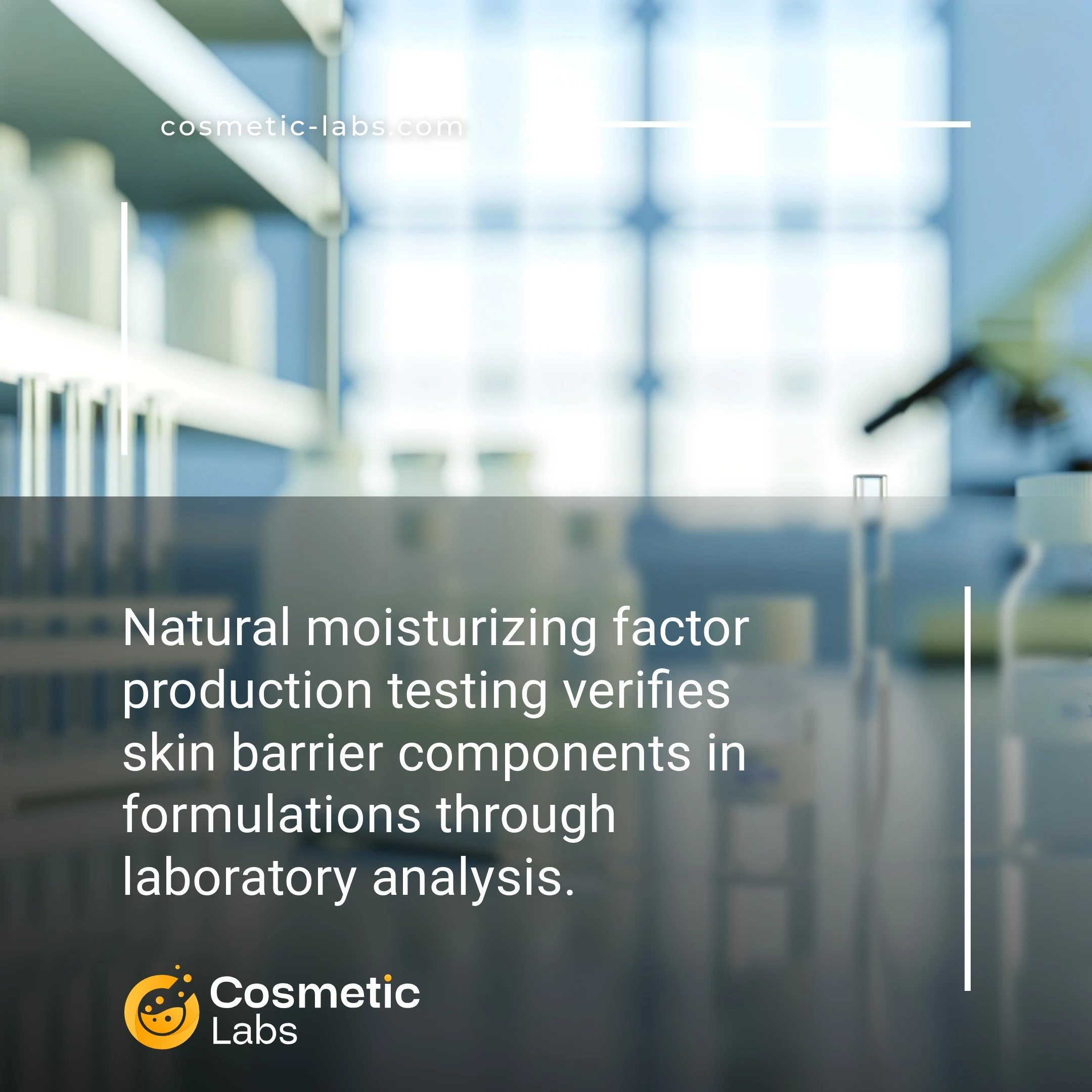Natural Moisturizing Factor Testing Labs for Cosmetic Brands

What is Natural moisturizing factors production testing?
Natural moisturizing factor production testing services evaluate how cosmetic ingredients and formulations stimulate the skin’s own production of amino acids, urea, and lactate—the compounds that naturally maintain skin hydration. Labs use in vitro keratinocyte cultures to measure NMF synthesis rates, providing quantitative data on how your products enhance the skin’s moisture retention mechanisms rather than just adding surface hydration.
Why do you need this service?
Cosmetic labs use natural moisturizing factor production testing to validate your hydrating serums and moisturizers before market launch, measuring amino acid synthesis and ceramide production in skin models. Teams rely on these assays to optimize ingredient concentrations in formulations, ensuring your products deliver measurable hydration improvements that support marketing claims and regulatory submissions.
Who provides Natural moisturizing factors production testing services?
All cosmetic labs providing Natural moisturizing factors production testing services
There is no company providing these services at the moment.
Natural Moisturizing Factor Testing Services
Labs on our platform offer natural moisturizing factor (NMF) testing services that measure your product’s ability to support skin barrier function and hydration retention. These tests evaluate how well your formulations interact with the skin’s natural humectants like amino acids, urea, and lactic acid.
NMF Component Analysis
Testing facilities analyze individual NMF components in your products using chromatography and spectroscopy methods. Labs measure concentrations of key moisturizing compounds and their bioavailability after topical application. This data helps you optimize ingredient ratios for maximum hydration benefits.
Standard NMF testing includes:
- Amino acid profile quantification
- Urea and pyrrolidone carboxylic acid levels
- Lactate and mineral content assessment
- Penetration depth measurements
Skin Barrier Function Evaluation
Labs test how your products support the skin’s natural moisture barrier through transepidermal water loss (TEWL) measurements and corneometer readings. These tests run on reconstructed skin models or ex-vivo tissue samples to simulate real-world performance. Results show whether your formulation enhances or disrupts natural moisturizing processes.
Testing protocols measure barrier recovery time, moisture retention capacity, and long-term hydration effects. Labs provide detailed reports comparing your product’s performance against industry benchmarks and competitor formulations.
Connect with specialized labs on our platform to discuss your NMF testing requirements and timeline.
Applications of Natural Moisturizing Factor Production Testing Services
Cosmetic labs validate NMF production capabilities through targeted assays that measure amino acid synthesis, urea generation, and ceramide formation in skin models.
Product Development and Formulation Optimization
Labs use natural moisturizing factor production testing to screen active ingredients during early-stage formulation. Teams evaluate how peptides, amino acid derivatives, and botanical extracts stimulate filaggrin breakdown and subsequent NMF component release. Testing protocols measure amino acid concentrations, lactate levels, and pyrrolidone carboxylic acid production over 24-72 hour periods.
This data guides ingredient selection and concentration optimization. Labs compare multiple formulation variants to identify combinations that maximize NMF synthesis rates while maintaining product stability and skin compatibility.
Efficacy Claims Substantiation
Brands require documented proof for moisture barrier enhancement claims on product packaging and marketing materials. Labs conduct NMF production assays using reconstructed skin models or ex-vivo tissue samples to generate quantifiable data. Testing measures baseline NMF levels, then tracks increases following ingredient exposure.
Results support specific claims like “increases natural moisturizing factors by 40%” or “enhances amino acid production within 48 hours.” Labs provide detailed reports with statistical analysis that meet regulatory requirements for cosmetic efficacy documentation.
| Testing Method | Measurement Focus | Typical Timeline | Application |
|---|---|---|---|
| Amino Acid Quantification | Serine, glycine, alanine levels | 24-72 hours | Ingredient screening |
| Urea Production Assay | Urea concentration changes | 48-96 hours | Formulation optimization |
| Filaggrin Breakdown Analysis | Protein degradation products | 72-120 hours | Claims substantiation |
| Lactate Measurement | Metabolic activity markers | 12-48 hours | Rapid screening |
Connect with specialized cosmetic labs on our platform to access NMF production testing services tailored to your product development needs.
